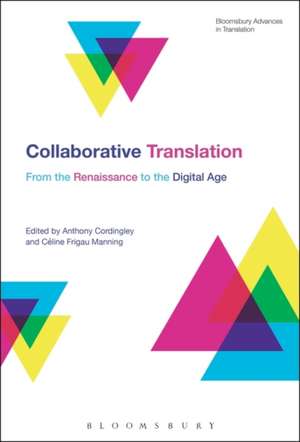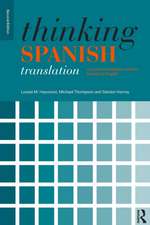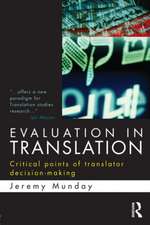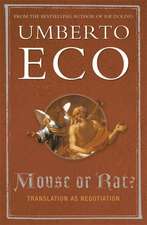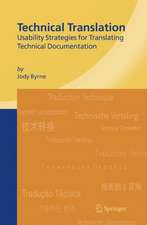Collaborative Translation: From the Renaissance to the Digital Age: Bloomsbury Advances in Translation
Editat de Dr Anthony Cordingley, Céline Frigau Manningen Limba Engleză Paperback – 27 iun 2018
| Toate formatele și edițiile | Preț | Express |
|---|---|---|
| Paperback (1) | 238.22 lei 6-8 săpt. | |
| Bloomsbury Publishing – 27 iun 2018 | 238.22 lei 6-8 săpt. | |
| Hardback (1) | 773.81 lei 6-8 săpt. | |
| Bloomsbury Publishing – 14 dec 2016 | 773.81 lei 6-8 săpt. |
Din seria Bloomsbury Advances in Translation
- 23%
 Preț: 192.55 lei
Preț: 192.55 lei - 22%
 Preț: 257.03 lei
Preț: 257.03 lei - 21%
 Preț: 218.74 lei
Preț: 218.74 lei - 22%
 Preț: 225.24 lei
Preț: 225.24 lei - 22%
 Preț: 256.20 lei
Preț: 256.20 lei - 23%
 Preț: 198.30 lei
Preț: 198.30 lei - 22%
 Preț: 230.79 lei
Preț: 230.79 lei - 14%
 Preț: 197.77 lei
Preț: 197.77 lei - 23%
 Preț: 192.48 lei
Preț: 192.48 lei - 22%
 Preț: 259.34 lei
Preț: 259.34 lei - 23%
 Preț: 198.30 lei
Preț: 198.30 lei -
 Preț: 217.62 lei
Preț: 217.62 lei - 13%
 Preț: 257.03 lei
Preț: 257.03 lei - 13%
 Preț: 263.62 lei
Preț: 263.62 lei - 30%
 Preț: 569.06 lei
Preț: 569.06 lei - 13%
 Preț: 238.94 lei
Preț: 238.94 lei - 13%
 Preț: 181.77 lei
Preț: 181.77 lei - 30%
 Preț: 598.45 lei
Preț: 598.45 lei - 22%
 Preț: 239.02 lei
Preț: 239.02 lei - 23%
 Preț: 197.86 lei
Preț: 197.86 lei - 22%
 Preț: 256.59 lei
Preț: 256.59 lei - 11%
 Preț: 344.52 lei
Preț: 344.52 lei - 23%
 Preț: 191.04 lei
Preț: 191.04 lei - 24%
 Preț: 189.70 lei
Preț: 189.70 lei - 22%
 Preț: 258.42 lei
Preț: 258.42 lei - 13%
 Preț: 256.59 lei
Preț: 256.59 lei - 13%
 Preț: 257.12 lei
Preț: 257.12 lei
Preț: 238.22 lei
Preț vechi: 305.99 lei
-22% Nou
Puncte Express: 357
Preț estimativ în valută:
45.58€ • 47.59$ • 37.73£
45.58€ • 47.59$ • 37.73£
Carte tipărită la comandă
Livrare economică 05-19 aprilie
Preluare comenzi: 021 569.72.76
Specificații
ISBN-13: 9781350075290
ISBN-10: 1350075299
Pagini: 272
Dimensiuni: 156 x 234 x 21 mm
Greutate: 0.39 kg
Ediția:NIPPOD
Editura: Bloomsbury Publishing
Colecția Bloomsbury Academic
Seria Bloomsbury Advances in Translation
Locul publicării:London, United Kingdom
ISBN-10: 1350075299
Pagini: 272
Dimensiuni: 156 x 234 x 21 mm
Greutate: 0.39 kg
Ediția:NIPPOD
Editura: Bloomsbury Publishing
Colecția Bloomsbury Academic
Seria Bloomsbury Advances in Translation
Locul publicării:London, United Kingdom
Caracteristici
Overturning the myth of the singular translator who toils in isolation, the book details the multiplicity of actors that support and influence the translator's work, from peers and revisers, to editors and clients, from cultural institutions to the nation itself
Notă biografică
Anthony Cordingley is Associate Professor at the Université Paris 8, France, on secondment to the University of Sydney, Australia as ARC Discovery Early Career Research Fellow.Céline Frigau Manning is Associate Professor at the Université Paris 8, member of the Institut Universitaire de France.
Cuprins
Notes on Contributors1. What is collaborative translation?, Anthony Cordingley and Céline Frigau Manning Part I: Reconceptualizing the translator : Renaissance and Enlightenment perspectives 2. On the incorrect way to translate: The absence of collaborative translation from Leonardo Bruni's De interpretatione recta, Belén Bistué 3. Towards a practice-theory of translation: on our translations of Savonarole, Machiavel, Guichardin and their effects, Jean-Louis Fournel and Jean-Claude Zancarini 4. "Shared" Translation: the Example of Forty Comedies by Goldoni in France (1993-1994), Françoise Decroisette Part II: Collaborating with the author5. Author-translator collaborations: a typological survey, Patrick Hersant6. Vladimir Nabokov and his translators: collaboration or translating under duress, Olga Anokhina 7. Günter Grass and his translators: from a collaborative dynamic to a controlling apparatus?, Céline Letawe 8. Contemporary poetry and transatlantic poetics at the Royaumont Translation Seminars (1983-2000): an experimental language laboratory, Abigail LangPart III: Environments of collaboration9. Online multilingual collaboration: Haruki Murakami's European translators, Ika Kaminka and Anna Zielinska-Elliott 10. Translation crowdsourcing: research trends and perspectives, Miguel A. Jiménez-Crespo 11. The role of institutional collaborations in contexts of official bilingualism: The Canadian example, Gillian Lane-Mercier 12. A new ecology for translation? Collaboration and resilience, Michael CroninIndex
Recenzii
Presents insightful case studies elaborating on various forms of collaborative translation, and includes detailed lists of references directing further reading. The scope of this book, ranging from the Renaissance to the digital age, provides the reader with an efficient exploration of the topic ... This book invites readers to think about the potential perspectives with which one can approach detailed case studies, and raises important questions.
A ground-breaking collection by both rising and confirmed stars in the field. Questioning "the trope of the solitary translator" from a wide range of perspectives, several of these essays are destined to become classic references. Required reading for anyone wanting to know how cooperation and confrontation have shaped translations from the European Renaissance to our digital age.
Translators are constantly in conversation - with their authors, with each other, with other stakeholders. This scintillating collection engages in detail with some of the many facets of collaborative translation, from the ways authors debate with their translators to the dynamics of translator collectives, from crowd-sourcing and institutional agendas to an ecological vision of shared translation in the future. A very timely book.
This thought-provoking volume makes the work of translators 'visible' in a somewhat unexpected way by decentering it and highlighting its intrinsically social and interactive dimensions. The book maps different degrees and modes of collaboration across a range of languages, periods, genres and technologies, drawing on various complementary theoretical approaches to enrich the discussion. It makes for fascinating reading for scholars and students of translation but - by the very nature of the project - also reaches out to anyone interested in the issue of authorship in the widest possible sense of the term.
A ground-breaking collection by both rising and confirmed stars in the field. Questioning "the trope of the solitary translator" from a wide range of perspectives, several of these essays are destined to become classic references. Required reading for anyone wanting to know how cooperation and confrontation have shaped translations from the European Renaissance to our digital age.
Translators are constantly in conversation - with their authors, with each other, with other stakeholders. This scintillating collection engages in detail with some of the many facets of collaborative translation, from the ways authors debate with their translators to the dynamics of translator collectives, from crowd-sourcing and institutional agendas to an ecological vision of shared translation in the future. A very timely book.
This thought-provoking volume makes the work of translators 'visible' in a somewhat unexpected way by decentering it and highlighting its intrinsically social and interactive dimensions. The book maps different degrees and modes of collaboration across a range of languages, periods, genres and technologies, drawing on various complementary theoretical approaches to enrich the discussion. It makes for fascinating reading for scholars and students of translation but - by the very nature of the project - also reaches out to anyone interested in the issue of authorship in the widest possible sense of the term.
